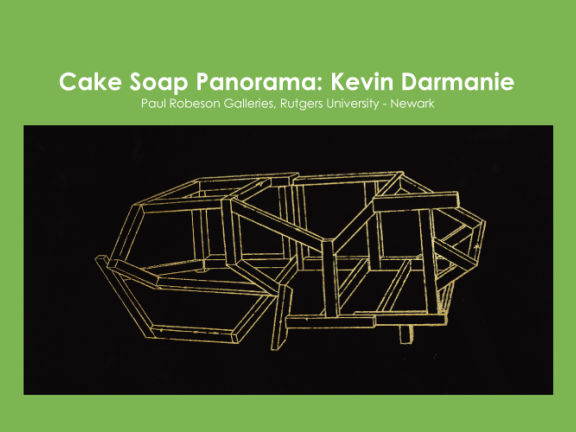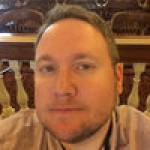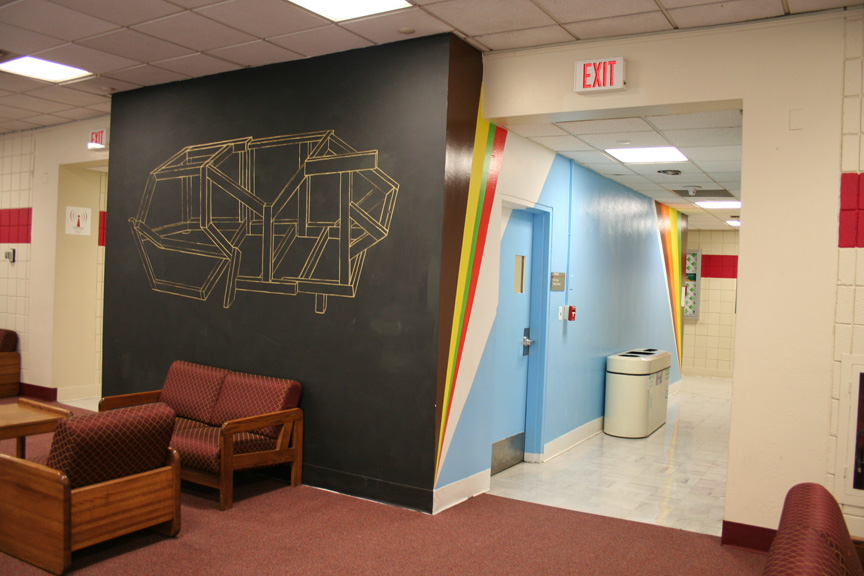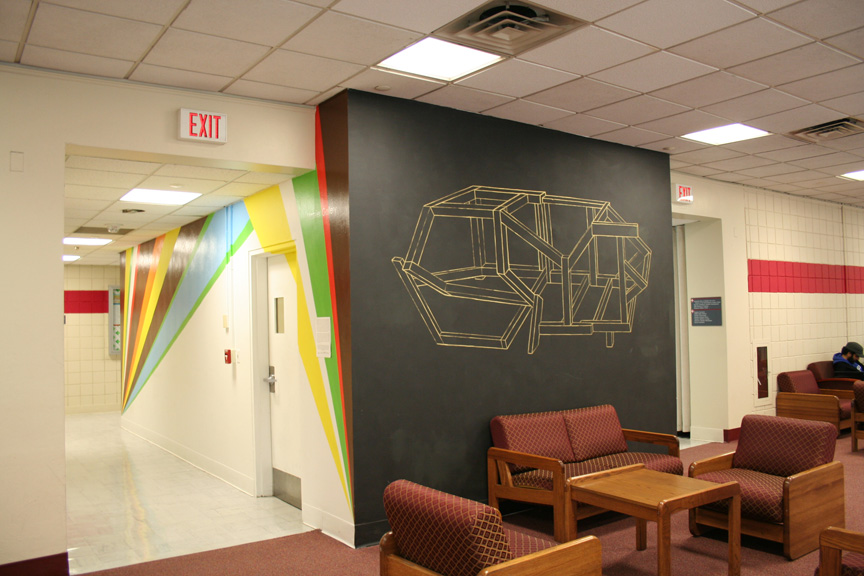Newark Artist Integrates Two Cultural Perspectives In His Collection of Murals at Rutgers' Paul Robeson Galleries

Kevin Darmanie has spent years as a member of Newark’s often unheralded arts scene — but his career technically began in a classroom 2,220 miles away. He drew his first sketches as an 11-year-old student in his home country of Trinidad & Tobago, an island nation in the Caribbean.
“I used to take my composition books and turn them into comic books,” Darmanie remembers. “Of course, your friends say, ‘Wow that’s nice.’ When it turns into this social engagement thing and your friends identify you as ‘The Artist,’ you kind of pick up on that. ‘Oh, this is a way to kind of be cool.’”
For Darmanie, it was only the beginning. He left Trinidad for the U.S. at age 14, and in the decades since, he graduated from East Orange High School, became a comic book artist, transitioned into painting, and opened up his own studio and gallery space in Newark.
But his newest work is a return to the nation of his birth. “Cake Soap Panorama,” a collection of murals on display at the Paul Robeson Galleries on Rutgers University’s Newark campus until July 31, is an exploration of what Darmanie calls “the distant aggressiveness of the Caribbean and the liberal individualism of the American.”
“I am looking back at my roots and pulling the whole thing together,” he explains. “What am I? Who am I?”
In other words, it’s the work of a man who calls two countries home.
“For a time, I felt like I was living purely in two identities,” Darmanie says. “Today, I work to be more complete. I exist as a body interpreted from multiple perspectives.”
Decked in dreadlocks and a perpetual smile, Darmanie is giddy when he talks about his Trinidad, a nation of twin islands that gained its independence from England more than a half-century ago. He remembers being inspired as a kid by his mother, a seamstress who often drew figures in his storybooks and made costumes for the popular Carnival festival that Trinidad celebrates every year.
“That’s where my creative incentive came from,” Darmanie explains.
He arrived in New Jersey in the late 1980s. After high school, Darmanie took beginning architecture classes at Rutgers-Newark. “But I realized I was kind of doing architecture to not do art,” he said.
So, he took art classes at the now-defunct Newark School of Fine and Industrial Arts and began drawing comics with a new company in East Orange. Soon, he wrote and drew a three-comic superhero series called “Kulprit.”
“I was kind of deconstructing what a hero was,” Darmanie says of the work, which was finished in 1997 and published 10 years later as a graphic novel. “Kind of like ‘The Punisher,’ but I kind of picked ‘The Punisher’ apart. It’s kind of like ‘Death Wish.’ What would motivate someone to go out there—kind of like a vigilante—pick up a gun and shoot people?”
But he soon tired of comics. “I just kind of felt like a dork,” Darmanie recalls, laughing. “I wanted the intellectual stimulation that was happening in the art world. The words people used when they were talking about art. ‘What are they talking about? They don’t talk about comics like that.’”
He turned to painting, and after a stint as an interior designer, Darmanie opened the Kedar Studio of Art in Newark, where he crafted his pieces and displayed the work of fellow artists. He has since shuttered the studio to focus on his own work.
You’ll find “Cake Soap Panorama” on the third floor of the Rutgers-Newark student center. Step out of the elevator, and you’ll see the first of three murals: a large wall covered in dark gray paint and the words “Free World Boss” sprawled in giant black block letters.
The phrase is a reference to Vybz Kartel, a controversial star in the dancehall genre of music that’s popular in the Caribbean. Earlier this month, Kartel was sentenced to life in prison for the murder of a businessman in Jamaica.
“I’m fascinated by him because I love how he’s able to push people’s buttons,” Darmanie says. “He stirs all of those issues up.”
At the time of his arrest, Kartel was calling himself a “World Boss.” So, his fans started saying, “Free World Boss.”
“I liked the way that phrase read,” Darmanie explains. “Because I read it from an American perspective, where you’re thinking, ‘leader of the free world.’ If you’re the Free World Boss, what does that mean? Does that mean you take complete advantage of these new freedoms? If you’re from the Caribbean, you read it one way. If you’re from here, you read it another way. It’s that double identity thing.”
The second part of the piece is a pair of walls painted in vibrant colors that many associate with Trinidad and its Carnival celebration. Then, around the corner is the third mural: a large black wall emblazoned with a striking, maze-like structure painted in gold. It was inspired by a lyric in by Trinidad singer Mighty Sparrow, in which he calls a person a “tool made for agriculture.”
“He was mocking the Queen of England saying that about a commoner,” Darmanie says. “I thought that was an interesting way to describe a person. … And when I did this thing, it was kind of like pieces of wood nailed together — almost like two-by-fours. Which makes you think of manual labor. It’s simple, but it can also be seen as very complex.
“Does it make sense as a structure? Probably not. But I kind of use it as a metaphor for that culture. People look at the Caribbean as being this simple culture, but it’s actually much more complex than that. And vice-versa. Sometimes it looks much more complex, but you can also see it as relatively simple. I kind of like that back-and-forth.”
As for what the title “Cake Soap Panorama” actually means? That’s another Vybz Kartel reference. The singer drew controversy for bleaching his skin — which Darmanie says is a “hot topic” in the Caribbean.
“They thought they were past all that stuff,” he says. “‘We’ve grown past that. While other people are still fighting with the identity, we know who we are.’ But he highlighted it by doing it to himself. He did this interview where he talked about how skin bleaching today is not what it was like years ago. Years ago, it was about this kind of self-hatred thing. Today, it’s a tool. For him, he uses it as a tool for him to stimulate controversy and keep his career going.”
Darmanie was struck by that.
“Two things hit me: This idea of using bleaching as this tool to agitate the masses, and the threat of resurrecting this old demon of self-hatred, this post-colonial residue type of thing. But then it was also another phenomenon I noticed, where a lot of youth are the sons and daughters of the Bob Marleys. We were all part of that movement of black and proud. They now feel like they want to get out of that box. Because they felt it was good and they honor it and respect it, but they feel like it put them in a box. So, I took it as a new freedom — almost like the beginnings of going into a new identity.”
And the “cake soap” part? Darmanie explains that when Kartel was asked how he bleaches his face, he jokingly said he uses cake soap — a substance usually used to wash clothes.
The murals at Rutgers aren’t the only work in which Darmanie explores his connections to Trinidad. He has pieces with a similar theme set to be displayed in an exhibit at the Gateway Center in Newark that opens Thursday.
“It’s kind of like a follow-up,” Darmanie says.
Saturday, April 19 at noon, join a walking tour with Darmanie as he talks about his mural series before moving on to his exhibition at the Gateway Project.
"Cake Soap Panorama: Kevin Darmanie" is held in the Messier Gallery of Rutgers University Newark's Paul Robeson Galleries, 350 Martin Luther King Jr. Blvd. Newark, NJ. The exhibit runs through July 31. Gallery hours are Monday-Thursday, 8 a.m.-10 p.m.; Friday, 8 a.m.-8 p.m.; and Saturday, 11 a.m.-7 p.m. For more information, visit http://artgallery.newark.rutgers.edu/.


